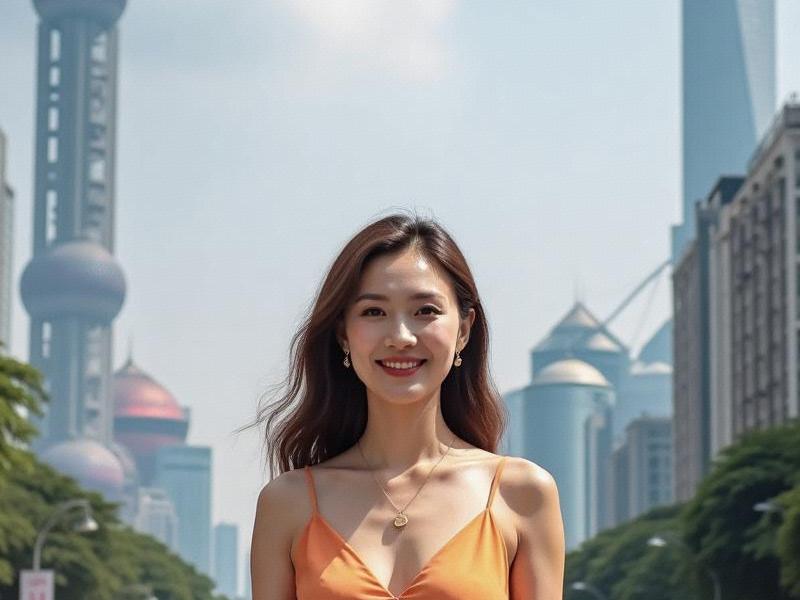
In the shimmering metropolis of Shanghai, where the Huangpu River divides colonial-era Bund from the space-age skyline of Pudong, a quiet revolution in feminine identity is unfolding. The Shanghai woman—long admired across China for her sophistication—has evolved into a global archetype of urban femininity that fascinates sociologists and fashion observers alike.
The Shanghai Style Code: Decoding the Urban Aesthetic
What makes a Shanghai woman instantly recognizable? Local stylist Mia Zhang identifies three signature elements: "First, the 'luxe casual' approach—they'll wear a ¥20,000 Chanel jacket with ¥200 sneakers. Second, the 'calculated imperfection'—a deliberately messy bun that took an hour to style. Third, the 'heritage accent'—always one traditional element, like embroidered sleeves or jade earrings."
This distinctive fashion philosophy reflects deeper cultural negotiations. While Western fast fashion brands flood Chinese markets, Shanghai women demonstrate remarkable brand discernment. Data from market research firm Mintel shows Shanghai leads China in:
• Premium skincare adoption (73% of women use luxury beauty products weekly)
• Sustainable fashion purchases (42% prioritize eco-friendly brands)
• Local designer support (68% regularly buy from Shanghainese fashion houses)
Professional Prowess: The Boardroom Warriors of East China
新上海龙凤419会所 Behind the polished exteriors lie some of Asia's most formidable business minds. Shanghai's female workforce participation stands at 68.3% (compared to 61.5% nationally), with women founding 39% of the city's tech startups last year—the highest rate among China's first-tier cities.
Investment banker Sophia Wu, 34, typifies this professional class. "My team at Goldman Sachs Asia is 60% female," she notes during an interview at Xintiandi's chic %Arabica café. "We don't see glass ceilings here—we see escalators moving fast enough that you'd better run in your Louboutins."
Yet challenges persist. The "leftover women" (剩女) stigma still pressures unmarried professionals over 30, despite Shanghai's progressive reputation. Innovative matchmaking services like "Elite 360" now cater specifically to high-achieving women, blending traditional matchmaking with executive networking.
Cultural Anchors in a Sea of Change
What truly distinguishes Shanghai's women is their role as cultural custodians. While embracing global influences, they preserve distinct local traditions:
上海龙凤419体验 1. Language: Fluent code-switching between Mandarin, Shanghainese, and English
2. Cuisine: Mastering both French pastry techniques and ancestral soup recipes
3. Social rituals: Maintaining lunar calendar traditions while organizing feminist book clubs
Professor Elena Lin of Tongji University observes: "Shanghai women perform cultural triage—preserving what nourishes the soul while adapting what serves practical modernity. Their handbags contain both lipstick and a mooncake mold."
The Next Wave: Gen Z Redefines Shanghai Femininity
Shanghai's Gen Z women are writing new rules. Digital natives like 19-year-old influencer "LunaQ" (2.3M Douyin followers) blend traditional aesthetics with internet culture—her viral videos feature qipao fashion paired with K-pop dances.
Educational trends reveal intriguing shifts:
上海喝茶群vx • 62% of female high schoolers study STEM (vs. 51% nationally)
• 89% are bilingual by graduation
• 73% plan to start businesses rather than seek traditional employment
Yet even these digital pioneers maintain deep roots. As LunaQ explains while streaming from her Jing'an studio: "My live commerce sells modern cheongsams—but every Sunday, I still have tea with my grandparents and learn Shanghainese nursery rhymes."
The Shanghai Formula: Global Grace Meets Local Wisdom
As sunset gilds the Oriental Pearl Tower, the city's women continue their daily ballet of tradition and innovation. From the silk-clad matriarchs practicing tai chi in Century Park to the tech entrepreneurs pitching in WeWork pods, they collectively embody Shanghai's essence—a city that honors its past while striding confidently into the future.
Their secret? Perhaps it's the Shanghainese concept of "hui guo" (会过)—the art of living well without ostentation. In a world obsessed with extremes, Shanghai women master the middle way: ambitious yet grounded, fashionable yet substantive, global yet profoundly local. As China's most international city accelerates into the mid-21st century, its women remain both the keepers of tradition and the architects of tomorrow's femininity.
